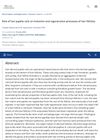Search
for
Sort by
Research
900-930 / 1000+ resultsresearch Biological Activity and Hair Inducing Function of Biomimetic Dermal Papilla Spheres Prepared by Hanging Drops of Methacrylate Gelatin
Biomimetic dermal papilla spheres can help regenerate hair to some extent.

research Hair-Loss Preventing Effect of Grateloupia Elliptica
Grateloupia elliptica extract may help prevent hair loss and promote hair growth.
research Differences in Hair Follicle Dermal Papilla Volume Are Due to Extracellular Matrix Volume and Cell Number: Implications for the Control of Hair Follicle Size and Androgen Responses
Hair follicle size is mainly influenced by the number of cells and extracellular matrix volume, with cell number having a larger impact.
research Dermal-Epidermal Interactions in Hair Follicle Development and Maintenance
Hair loss is mainly caused by hormones, autoimmune issues, and chemotherapy, and needs more research for treatments.
research Somatosensory Organization and Behavior in Naked Mole-Rats: Peripheral Structures, Innervation, and Selective Lack of Neuropeptides Associated with Thermoregulation and Pain
Naked mole-rats have unique skin and hair nerve structures, lacking certain pain and temperature-related neuropeptides.

research Role of Hair Papilla Cells in Induction and Regeneration Processes of Hair Follicles
Hair papilla cells can create and regenerate hair bulbs under the right conditions.
research Nestin-Expressing Interfollicular Blood Vessel Network Contributes to Skin Transplant Survival and Wound Healing
Nestin-expressing blood vessels help skin transplants survive and heal.

research Wound Regeneration Deficit in Rats Correlates with Low Morphogenetic Potential and Distinct Transcriptome Profile of Epidermis
Rats can't grow new hair follicles after skin wounds, unlike mice, due to differences in gene expression and response to WNT signaling.
research In Vitro Neural Differentiation of CD34+ Stem Cell Populations in Hair Follicles by Three Different Neural Induction Protocols
Hair follicle stem cells can become neural cells using different methods, with varying efficiency.
research Ability to Culture Dermal Papilla Cells from Red Deer Hair Follicles with Differing Hormonal Responses In Vivo Offers a New Model for Studying the Control of Hair Follicle Biology
Red deer hair cells offer a new way to study how hormones affect hair growth.

research Hair Growth-Promoting Effects of Sargassum Glaucescens Oligosaccharides Extracts
Extracts from a type of brown seaweed can help promote hair growth.

research Isolating Dermal Papilla Cells from Human Hair Follicles Using Microdissection and Enzyme Digestion
The method successfully isolates cells that are important for hair growth and could help study hair loss.
research Proteomics Demonstration That Histone H4 Is a Colchicine-Induced Retro-Modulator of Growth and Alkaline Phosphatase Activity in Hair Follicle Dermal Papilla Culture
Histone H4, released by cells exposed to colchicine, can cause hair loss by inhibiting cell growth and enzyme activity.
research There And Back Again: Hair Follicle Stem Cell Dynamics
Hair follicle stem cells can return to their original niche and help regenerate hair.

research Establishment of an Immortalized Mouse Dermal Papilla Cell Strain with Optimized Culture Strategy
Researchers created a long-lasting mouse skin cell strain that may help with hair growth research and treatments.

research In Vivo and In Vitro Hair Growth Promotion Effects of Extract from Glycine Soja Siebold et Zucc
Glycine soja extract stimulates hair growth and could help treat hair loss.

research Pyruvate Kinase M2 Promotes Hair Regeneration by Connecting Metabolic and Wnt/β-Catenin Signaling
Pyruvate Kinase M2 helps hair grow by linking energy production and a key hair growth pathway.

research K15 And Id3 Expression In Intact And Regenerating Adult Vibrissae Rodent Hair Follicles
K15 and Id3 are important in hair follicle regeneration, with K15 increasing in early stages and Id3 responding later.
research A Novel Gene Homologous to Teashirt Is Differentially Expressed in Neonatal Mouse Skin During Development of Hair Follicles
research Induced Pluripotent Stem Cell Approach to Hair Follicle Regeneration
iPSCs could help develop treatments for hair loss.
research Alopecia Areata Is Driven by Cytotoxic T Lymphocytes and Is Reversed by JAK Inhibition
Alopecia areata can be reversed by JAK inhibitors, promoting hair regrowth.
research Epidermal Notch Signaling: Differentiation, Cancer, and Adhesion
Notch signalling helps skin cells differentiate and prevents tumors.
research The Malignant Capacity of Skin Tumors Induced by Expression of a Mutant H-Ras Transgene Depends on the Cell Type Targeted
The risk of skin tumors becoming malignant depends on the specific skin cell type affected.
research Gene Expression Profiling Gets to the Root of Human Hair Follicle Stem Cells
Human hair follicle stem cells can be isolated using specific markers for potential therapeutic use.
research Regulation of Keratin 9 in Nonpalmoplantar Keratinocytes by Palmoplantar Fibroblasts Through Epithelial-Mesenchymal Interactions
Nonpalmoplantar skin cells can be made to express keratin 9 by interacting with palmoplantar fibroblasts.

research Valproic Acid Induces Hair Regeneration in Murine Model and Activates Alkaline Phosphatase Activity in Human Dermal Papilla Cells
Valproic Acid helps regrow hair in mice and activates a hair growth marker in human cells.

research Platelet-Rich Plasma as a Potential Treatment for Noncicatricial Alopecias
Platelet-rich plasma, which carries growth factors, could be a promising treatment for non-scarring hair loss, promoting hair growth and density with no major side effects.
research Canine Follicle Stem Cell Candidates Reside in the Bulge and Share Characteristic Features with Human Bulge Cells
Canine hair follicles have stem cells similar to human hair follicles, useful for studying hair disorders.

research A Split Head Study of Efficacy of Placebo Versus Platelet-Rich Plasma Injections in the Treatment of Androgenic Alopecia
Platelet-rich plasma injections can effectively treat male pattern hair loss, improving hair density and quality with high patient satisfaction.